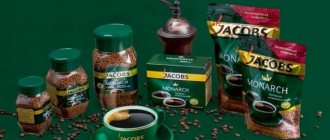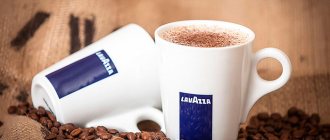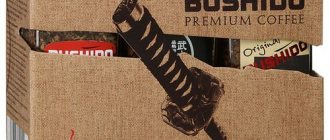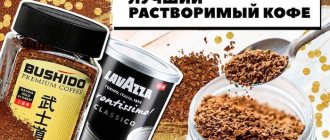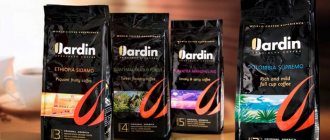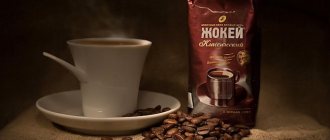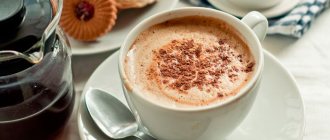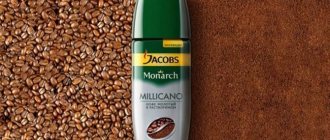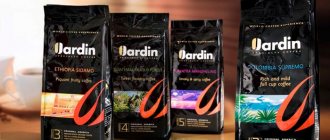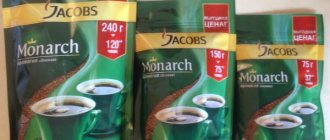A large number of people in our world love the drink coffee. Many people cannot live a day without drinking a cup or two of aromatic coffee. Some people know how to invigorate themselves with the help of a drink, some like the taste, and some are simply addicted. You can’t argue with everyone, because everyone has their own taste. But it’s worth remembering that coffee has its pros and cons, and in general, you shouldn’t overdo it with any drink or food, even healthy ones. Therefore, it is better to observe the measure.
How much do you know about this drink? Our useful website will tell you everything. Let's consider what kind of Jacobs coffee is, what types there are, what characteristics, reviews from fans.
Brand history
When, in January 1895, the residents of Bremen saw an advertisement in the newspaper about the opening of a “special coffee, tea, biscuit and chocolate shop,” they could not even imagine that they were witnessing the birth of a brand of global importance.
Born into the family of an ordinary German peasant, Johann Jacobs studied the nuances of trading colonial goods at a commercial school, where he decided to engage in the supply of coffee. He moved to Bremen to open his own business in 1894, having previously worked in two companies involved in the trade of coffee beans. Johann was only 26 when he opened his store on the busiest street in Bremen.
The small store quickly became popular - the friendly and smiling young man behind the counter tried to please every customer at all costs, easily remembered names and tastes, and gave discounts to regular customers. Sales were so successful that in 1907 the entrepreneur was able to open his own factory for roasting coffee beans. That's when the first bags with the Jacobs inscription appeared - the harbingers of the new brand. The owner registered the registered trademark with the Imperial Patent Office on October 30, 1913.
The First World War stopped the rapid development of Johann Jacobs' enterprises: the embargo on coffee forced the entrepreneur to start selling rice, sugar and other food products. In 1920, he even tried his hand at the securities market. But after the monetary reform that broke out in 1923, the situation was deplorable: trade in stores was poor, the coffee roasting plant was empty - there was not enough money to pay the workers.
Walter, who joined his father’s business, suggested a solution - the family sold the most profitable of the stores and used the proceeds to restore production. He also proposed a new sales policy - now freshly roasted Jacobs beans were sold not only in the brand owners’ own stores, but also in other retail outlets. The ideas of the young partner helped the trademark owner open a new enterprise for roasting grains in 1934, where 3 hundred workers worked in shifts, and purchase 4 cars for delivering bags of grains to addresses. By 1938, the Jacobs family's turnover was 12.5 billion imperial marks.
But then the Second World War began: first, an embargo was introduced on coffee, then some stores were closed, and the empty factory was destroyed by bombing. In 1945, seventy-six-year-old Johann Jacobs, who survived the war, and his son began rebuilding their coffee business. He raised a worthy successor who successfully promoted the family business even after his father’s death. 10 years after the end of the war, the Jacobs brand was already a leader in the German market, a thousand branded cars delivered coffee throughout the country, and the branded drink was sold in all large stores in Germany.
In 1966, the company made its first attempt to expand its range and presented several varieties of its coffee - this is how Priva, Kronung, Tradition and Edel Mocca appeared. In the 70s, when Johann Klaus Jacobs's grandson took the helm of the German coffee empire, specialty coffee appeared on the world market - first in Austria, then in Switzerland. A young and enterprising businessman opened company offices in Denmark, France, Canada, and in some European countries he simply bought small coffee companies and gave them his name. Jacobs' expansion under his leadership continued into the 90s.
And then the company became part of the Kraft Foods Inc. concern. - second after Nestlé in the production of packaged food products. It was then that the brand’s visual changes took place - the packaging was painted bottle green. In 2012, Kraft Foods Inc. Divided into several subsidiaries, the Jacobs brand was transferred to one of them - Mondelez International. And 2 years later, in 2014, negotiations began on the merger of several coffee companies. The merger was completed in 2015 with the creation of Jacobs Douwe Egberts.
The popularity of the brand in the post-Soviet countries is extremely high; it successfully competes with Nescafe. And the number of people who want to “find their inspiration” by feeling the “magical Jacobs aroma, awakening the imagination and giving endless possibilities” is not decreasing.
Interesting Facts
- The University of Bremen is named after the grandson of the brand’s founder, Klaus Jacobs, who was also a philanthropist and founder of a Swiss charitable foundation.
- The brand's first advertising appeared with the arrival of Walter Jacobs, who proposed new packaging with an image of a bag of coffee and the inscription “Jacobs Caffe” in a stylized Gothic font in 1930. And in 1931 he came up with the first slogan - “Incredible pleasure to the last drop.”
- The first radio advertisement was aired in 1954. The new slogan “Jacobs wunderbar” was literally on everyone’s lips. And the first television commercial appeared in 1959, its heroine was Grandma Sofia, offering her grandchildren coffee “with the aroma of home.”
- The familiar golden crown on Jacobs packaging appeared in 1966, when the products began to be exported to Austria, Switzerland, and Denmark. The crown symbolized “royal quality”, and not the aristocracy of the brand, as its appearance is sometimes interpreted. The owners of the brand never claimed to be elite, but positioned their coffee as a mass-market product. That's why Jacobs had the largest distribution network in Europe in the 60s.
Reasons for such demand
Products of the Jacobs Monarch brand, represented by grain, ground and instant coffee, give its true lovers the opportunity to make their own choice. Appearing on the Russian market a decade and a half ago, the Jacobs coffee brand immediately gained incredible popularity here.
The secret of success was simple and quite expected: the Jacobs company supplied products of good quality, characterized by excellent taste and aromatic properties and a relatively low price. For quite a long time, only the instant product of this brand was supplied to Russians.
The success criteria of this brand include:
- maintaining consistently high quality of all products;
- achieving an optimal price-quality ratio, in the direction of reducing the first and increasing the second component;
- skillful advertising activities;
- wide range and variety of packaging.
Nowadays, the situation has changed dramatically: Jacobs brand products are presented in a full range on the shelves of Russian supermarkets.
Range
Jacobs coffee, produced by Kraft Foods, is positioned by its manufacturers as a product aimed at true connoisseurs of a great drink, but such ambitious statements do not entirely correspond to reality. All brands of instant, bean and ground coffee from the Jacobs brand would be more accurately described as products of average quality.
Considering its affordable price range and accessibility for all segments of the population, it can be considered an excellent product for everyday use, but this does not give grounds to advertise it as a product of the highest quality.
To be fair, it should be said that the combination of affordable cost, taste and quality makes coffee from the Jacobs brand a product worthy of buyers’ attention.
Marketers of our time confidently classify it as a mass-market product.
- The instant freeze-dried product line includes: decaffeinated coffee (containing a small dose of caffeine and having lost much of its aroma and taste), “green” Jacobs (a classic drink, so called because of the color of its packaging) and an enhanced flavor product (Intense). ), which is a new product of the brand.
- Natural ground coffee Jacobs Monarch is presented in two types of products, differing in different packaging options. Classic Jacobs Monarch coffee comes in a traditional green colored bag. The packaging containing Jacobs Monarch Espresso coffee is colored black. The grinding of both varieties is so fine that it makes it possible to brew it not only in the traditional way, but also directly in a coffee cup (this is what many lovers of this drink do).
- Jacobs Monarch Millicano coffee is a unique product, each instant granule of which contains ultra-fine ground coffee, giving the drink the smell and taste of natural beans and the convenience of instant coffee.
- Jacobs 3 in 1 sticks containing a mix product are available in three types: with a strong taste (Intense), with a milder taste (Latte) and a classic strength (Original).
- In addition to the varieties just listed, the Jacobs brand has one variety each of ground and bean coffee. Jacobs coffee beans are a blend of Congolese Robusta and Arabica, with varying degrees of roasting. The only drawback of both products, which have a balanced taste, is the inability to retain their inherent aroma for a long time after opening the sealed packaging. To prevent the valuable product from losing its quality within a few days, it should be immediately poured out of it into a tightly closed container.
The constant work of the company’s specialists to expand the range of coffee produced contributes to the even greater popularity of this product.
Jacobs coffee beans
We produce only classic Monarch, a mixture of Arabica and Robusta. The degree of roasting is medium, but the taste is rich and intense, slightly bitter, with pronounced sourness, quite intense. Bright aroma, long aftertaste.
Ground
Essentially the same classic branded blend, but in variants of different grinding and degree of roasting. Since many people buy crushed beans, the company offers them a choice:
Jacobs Monarch Classic - Robusta from Asia and Arabica from Latin America, a rather rich drink with a deep aroma;
Soluble
This is all a freeze-dried product prepared using the freeze-drying technology, which forms beautiful crystals. Sold in branded glass jars with a tight seal to preserve the flavor and aroma characteristics.
Jacobs monarch – the same taste of the signature blend, but in crystals;
The manufacturer recommends using water at a temperature of about 85 degrees for brewing. Boil the kettle and let the water cool for about a minute and a half.
Coffee Jacobs Millicano
Jacobs Milicano is a special product made using a relatively new technology: ultra-fine particles of natural coffee are mixed into freeze-dried crystals, and when prepared you get a drink with the aroma and taste of natural coffee. A little thick settles to the bottom.
Jacobs coffee 3 in 1
Very popular sticks that you can find in any store or kiosks that serve coffee in cups. There are several different flavors to choose from, but they all contain coffee, sugar and milk powder.
- Classic – traditional taste;
- Strong – darker roast, for those who like a distinct bitterness;
- Soft – lighter and lighter;
- Monarch – Same flavor as instant in a can.
- Cappuccino – with high foam, separate series;
- Latte Caramel – as milky as possible, with a hint of sweet caramel.
Jacobs 3 in 1 bags are sold both individually and in whole packages - convenient to take with you or prepare at work.
About the Russian coffee manufacturer Jacobs
- roasting green beans;
- extraction (extraction) of powder;
- sublimation of the resulting extract (consisting of the stages of deep freezing followed by vacuum drying).
The highest quality of products produced here is the result of the introduction of advanced production technologies. The company produces instant coffee of the most popular brands Jacobs Monarch, Carte Noir, Maxim and Jacobs Monarch Millicano.
In addition, the company packages powder and granular products of the Maxwell House and Jacobs Aroma brands, coming from factories located in Western Europe.
Tassimo
These are T-discs for popular coffee machines of the Tassimo standard - they have a special intelligent system built into them, which itself calculates how much water is needed, at what temperature and for how long to prepare the drink. In assortment:
- Americano
- Cappuccino
- Latte macchiato
- Latte macchiato caramel
- Cafe crema
- Espresso.
The brand uses Arabica and Robusta blends from different regions of the world developed by its own specialists to produce different types of coffee.
These are mainly Congolese Robusta and Brazilian Arabica, which give a classic taste with a slight sourness, by which lovers will recognize their Jacobs and will not confuse them with a fake.
How not to buy a fake
It is very rare, but still counterfeit Jacobs coffee products are found in Russia and other countries. Therefore, it is natural that we are all interested in how to distinguish an original product from a fake. So, if you buy coffee in glass jars, then the first thing you should pay attention to is that the Jacobs inscription should be convex.
Using a special typographic method, a convex or concave image is obtained.
Also, the geometry of the lid and jar must be of the correct shape, no dents or bends.
It is also worth paying attention to the label; the colors should be bright and the inscriptions should be clear. If we talk about coffee in soft packaging, then the counterfeit will have a fuzzy, dotted picture, with crooked ribs for opening.
Customer demand for Jacobs coffee
The long-term success of a company depends on the following criteria:
- High quality of products sold;
- Rich varied assortment;
- Affordable price;
- Successful advertising activities.
Jacobs has been known in Russia for about twenty years and is now a sales leader. The average cost of Jacobs products is accessible to every coffee connoisseur.
The brand's drinks are mainly sold in Eastern Europe and the post-Soviet space. The company ranks second in the world in coffee sales.
Reviews
On review sites, users often give the brand not very high ratings - on average, 4 or 4.5 out of 5, depending on the product. Compared to expensive luxury drinks, it may seem quite simple, but in fact, it is almost the best-selling coffee brand in the country, with millions of packages of all formats purchased annually.
“I bought ground Jacobs, classic. Usually I take something more expensive, but here I wanted it. Well, in general, for such a price it’s a normal product, although it can’t be compared with premium ones, of course. But it is ground well, the color is uniform, and the smell is not burnt. You can take it sometimes. Especially if you add spices and cream during cooking.” – Katya, Krasnodar
“Recently, we increasingly hire Milicano, the one with the addition of natural fried ingredients. It tastes good, smells strong, and cooks in half a minute - stir and it’s ready. And then the office smells nice. I recommend!" – Natasha, Ufa
“I tried Jacobs Velor and fell in love, I have never seen such gentle instant coffee. I wouldn’t buy it myself, I’m biased towards powder, but then a friend gave me a treat, and that’s it – I was lost! Delicate, sweetish, velvety, and what foam...! Everyone should try it, definitely! I’ve already bought myself two cans and haven’t gotten drunk yet!” – Elena, Sochi
In general, we can recommend Jacobs coffee - it is a large brand with its own history and vast experience in roasting beans and making blends. Gourmets may find it too simple, but most customers like it.
